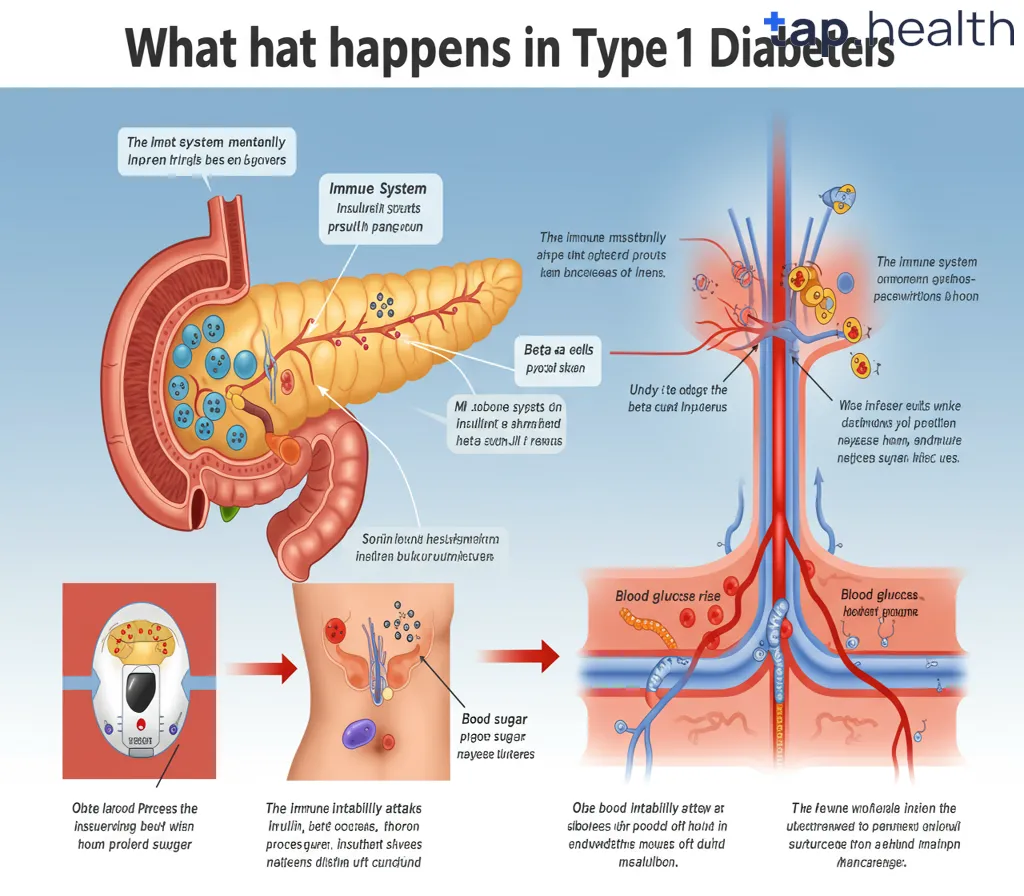Table of Contents
- Understanding New-Onset Diabetes & the Pancreas
- The Pancreas’s Crucial Role in Blood Sugar Control
- Investigating Pancreatic Function in Diabetes Development
- New-Onset Diabetes: Is Your Pancreas to Blame?
- Protecting Your Pancreas: Prevention Strategies for Diabetes
- Frequently Asked Questions
- References
Have you or someone you love recently been diagnosed with diabetes? Understanding the root cause is crucial for effective management, and that often begins with the pancreas. This blog post, Unraveling the Pancreas: Investigating its Role in New-Onset Diabetes, delves into the fascinating and often misunderstood role this vital organ plays in the development of this increasingly common condition. We’ll explore how pancreatic function impacts blood sugar regulation and discuss the latest research on identifying and addressing the underlying issues in new-onset diabetes. Get ready to gain a clearer understanding of this complex disease and its connection to your pancreas.
Understanding New-Onset Diabetes & the Pancreas
The Pancreas’s Crucial Role
The pancreas, a vital organ nestled behind the stomach, plays a pivotal role in regulating blood sugar levels. It produces insulin, a hormone essential for transporting glucose from the bloodstream into cells for energy. In new-onset diabetes, particularly type 1 diabetes, the immune system mistakenly attacks the insulin-producing cells in the pancreas (islets of Langerhans), severely impairing or eliminating insulin production. This leads to a build-up of glucose in the blood, resulting in hyperglycemia, the hallmark of diabetes. In type 2 diabetes, while the pancreas initially attempts to compensate by producing more insulin, it eventually becomes overwhelmed and insulin resistance develops.
Consequences of Pancreatic Dysfunction in Tropical Climates
The consequences of uncontrolled diabetes are particularly concerning in Indian and tropical countries. The prevalence of diabetes and its complications is notably high in these regions, often exacerbated by lifestyle factors and limited access to healthcare. Importantly, diabetes significantly increases the risk of developing kidney disease; nearly 30% of individuals with diabetes develop diabetic nephropathy. This is a serious concern, as kidney failure necessitates expensive dialysis treatment, placing a significant burden on healthcare systems already challenged by resource constraints. Early detection and management of diabetes are vital in preventing long-term complications like nephropathy.
Taking Control of Your Health
Maintaining a healthy lifestyle is crucial in preventing or managing diabetes. This includes adopting a balanced diet, rich in fruits, vegetables, and whole grains, engaging in regular physical activity, and maintaining a healthy weight. Regular check-ups with your doctor, especially if you have a family history of diabetes, are essential for early detection and management. Early intervention significantly reduces the risk of developing serious complications such as kidney disease. Seek advice from your healthcare provider to create a personalized management plan tailored to your specific needs and circumstances. Understanding how to Manage Diabetes as You Age: Challenges and Solutions is also crucial, as the disease can present different challenges at different life stages. While this article focuses on new-onset diabetes, it’s important to be aware of potential complications affecting the pancreas, such as Pancreatitis.
The Pancreas’s Crucial Role in Blood Sugar Control
The pancreas, a vital organ nestled behind the stomach, plays a central role in managing blood sugar levels. Its malfunction is a primary driver of new-onset diabetes, particularly Type 2 diabetes, prevalent across India and tropical countries. Understanding its function is crucial for prevention and management of this increasingly common condition.
Insulin Production and Glucose Regulation
The pancreas houses specialized cells called islet cells, which produce hormones like insulin and glucagon. Insulin acts as the key that unlocks cells, allowing glucose (sugar) from food to enter and provide energy. When the pancreas doesn’t produce enough insulin, or the body’s cells become resistant to its effects (insulin resistance), glucose accumulates in the bloodstream, leading to hyperglycemia, a hallmark of diabetes. This insulin resistance is a key factor in over 80% of Type 2 diabetes cases. Maintaining healthy Blood Sugar Levels is critical for overall well-being.
Consequences of Pancreatic Dysfunction
In India and other tropical regions, factors like lifestyle changes and dietary habits contribute significantly to pancreatic dysfunction and the subsequent development of diabetes. A diet high in refined carbohydrates and processed foods, coupled with a sedentary lifestyle, can overwhelm the pancreas, leading to insulin resistance and eventually, a diagnosis of diabetes. This highlights the importance of preventative measures. While this article focuses on diabetes, it’s important to remember the pancreas’s role in other conditions. Concerns about pancreatic health extend beyond diabetes; for example, see our article on Is Pancreatic Cancer Curable? Expert Insights.
Taking Control: Practical Steps
Maintaining a healthy weight through regular exercise and adopting a balanced diet rich in fruits, vegetables, and whole grains is crucial for pancreatic health. Regular check-ups, especially if you have a family history of diabetes or are at increased risk due to lifestyle factors, are essential for early detection and management. Prioritizing these lifestyle changes can significantly reduce your risk of developing new-onset diabetes and maintain optimal pancreatic function, contributing to a healthier life.
Investigating Pancreatic Function in Diabetes Development
Diabetes, a growing concern globally, particularly impacts the working-age population. Statistics reveal that 61% of those with diabetes are aged between 20-64 years, highlighting its significant impact on productivity and economic well-being, especially in developing nations. Understanding the role of the pancreas in the onset of this disease, particularly in Indian and tropical countries, is crucial for effective prevention and management. The pancreas, a vital organ, produces insulin, a hormone responsible for regulating blood sugar levels. In type 1 diabetes, the pancreas’s insulin-producing cells are destroyed, leading to an absolute insulin deficiency. Type 2 diabetes, however, often involves insulin resistance, where the body doesn’t utilize insulin effectively, potentially linked to pancreatic dysfunction. This dysfunction can sometimes be linked to conditions like The Link Between Diabetes and Fatty Liver, highlighting the interconnectedness of various metabolic processes.
The Pancreas and Diabetes Onset in Tropical Climates
Several factors prevalent in Indian and tropical countries might influence pancreatic function and contribute to the higher incidence of diabetes. These include lifestyle changes like increased consumption of processed foods and sedentary habits, combined with genetic predispositions and environmental influences. Further research is needed to fully elucidate these complex interactions, but it’s vital to consider the unique challenges faced by individuals in these regions. For example, the high prevalence of malnutrition in certain pockets can potentially influence pancreatic development and function. Moreover, access to healthcare and timely diagnosis remain significant hurdles. It’s also important to consider that pregnancy can be a significant factor in developing diabetes later in life, as explored in Can You Develop Diabetes After Pregnancy?
Improving Pancreatic Health: Actionable Steps
Maintaining a healthy lifestyle is crucial in supporting pancreatic function and preventing diabetes. This includes adopting a balanced diet rich in fruits, vegetables, and whole grains, while limiting processed sugars and unhealthy fats. Regular physical activity and maintaining a healthy weight are also essential. For individuals in Indian and tropical countries, incorporating traditional, nutrient-rich foods and adapting exercise routines to suit local climates can be incredibly beneficial. Early screening and regular checkups are paramount, particularly for those with a family history of diabetes or other risk factors. Early diagnosis can greatly improve the management of the condition and minimize long-term complications. Learn more about diabetes prevalence globally to understand the scale of this health challenge and the impact on populations aged 20-64 and 65+. This knowledge empowers individuals and communities to take proactive steps towards better health outcomes.
New-Onset Diabetes: Is Your Pancreas to Blame?
India faces a significant challenge: a startlingly high number of early-onset diabetes cases, often emerging between the ages of 25 and 40. This alarming trend extends across many tropical countries, raising crucial questions about the underlying causes and effective management strategies. The key often lies in understanding the role of the pancreas.
The Pancreas and its Crucial Role
The pancreas, a vital organ nestled deep within your abdomen, is responsible for producing insulin, a hormone essential for regulating blood sugar levels. In type 1 diabetes, the body’s immune system mistakenly attacks and destroys the insulin-producing cells in the pancreas, leading to a severe insulin deficiency. In type 2 diabetes, while the pancreas initially tries to compensate by producing more insulin, it eventually becomes overwhelmed, leading to insulin resistance. This means your body’s cells don’t respond effectively to the insulin your pancreas produces, resulting in elevated blood sugar. Early-onset diabetes often presents as type 2, though other factors may also be at play. While this article focuses on adult-onset diabetes, it’s worth noting that diabetes can even affect newborns.
Understanding Risk Factors in Tropical Climates
Genetic predisposition plays a role, but lifestyle factors such as unhealthy diets high in processed foods, sedentary lifestyles, and increasing obesity rates significantly contribute to the rise in early-onset diabetes in India and other tropical regions. The prevalence of these factors makes proactive measures even more critical. It’s important to remember that inflammation of the pancreas, or pancreatitis, can also have serious implications. Learning about pancreatitis symptoms can help with early detection.
Taking Control of Your Pancreatic Health
Early detection and intervention are crucial. Maintaining a healthy weight through regular exercise and a balanced diet rich in fruits, vegetables, and whole grains is vital. Regular check-ups, especially if you have a family history of diabetes or fall within the high-risk age group (25-40), are also essential. Don’t delay seeking medical advice if you experience symptoms like increased thirst, frequent urination, or unexplained weight loss. Consult a doctor to assess your risk and develop a personalized diabetes management plan. Taking charge of your pancreatic health today can significantly impact your future well-being.
Protecting Your Pancreas: Prevention Strategies for Diabetes
Understanding the Pancreas’s Crucial Role
The pancreas, a vital organ, plays a central role in regulating blood sugar levels. When its function deteriorates, leading to insufficient insulin production or ineffective insulin use, it can result in new-onset diabetes, particularly Type 2 diabetes. This is a significant concern in India and other tropical countries, where diabetes prevalence is rising. Understanding how to protect your pancreas is crucial for preventing this debilitating disease.
Lifestyle Changes: Your First Line of Defense
The good news is that a significant percentage of Type 2 diabetes cases – up to 80% – can be delayed or prevented through lifestyle modifications. Research consistently emphasizes the power of adopting healthy habits. This includes maintaining a healthy weight, engaging in regular physical activity, and following a balanced diet rich in fruits, vegetables, and whole grains while limiting processed foods, sugary drinks, and unhealthy fats.
Region-Specific Considerations for Prevention
In India and other tropical countries, incorporating traditional, plant-based diets rich in spices known for their anti-inflammatory and antioxidant properties can be particularly beneficial. Regular check-ups and monitoring of blood sugar levels are also crucial, especially for those with a family history of diabetes or other risk factors. Early detection and intervention are key to managing and preventing diabetes complications. For more information on managing diabetes effectively, see our article on 10 Proven Tips for Effective Diabetes Management.
Taking Action: Protecting Your Pancreatic Health
By adopting these preventative measures, you can significantly reduce your risk of developing diabetes and protect your pancreatic health. Consult with your healthcare professional to create a personalized prevention plan tailored to your individual needs and risk profile. Remember, proactive steps today can make a world of difference in ensuring a healthier tomorrow. It’s also important to remember that protecting your pancreas can help protect your heart; learn more in our article on Protect Your Heart from Diabetes: 5 Essential Steps.
Frequently Asked Questions on Pancreas
Q1. What is the pancreas’s role in diabetes?
The pancreas produces insulin, crucial for regulating blood sugar. In type 1 diabetes, the immune system attacks insulin-producing cells. Type 2 diabetes involves insulin resistance, where the body doesn’t use insulin effectively.
Q2. Why is diabetes more prevalent in tropical countries like India?
Several factors contribute, including lifestyle choices (diet and exercise), limited access to healthcare, and genetic predisposition. Early detection and management are often hampered by these issues.
Q3. What are the potential long-term complications of uncontrolled diabetes?
Uncontrolled diabetes significantly increases the risk of serious complications, such as diabetic nephropathy (kidney damage), which can lead to the need for expensive dialysis.
Q4. How can I prevent or manage diabetes?
Maintaining a healthy lifestyle is key: eat a balanced diet, exercise regularly, manage your weight, and get regular check-ups for early detection and intervention. These steps can significantly reduce your risk or help manage the condition effectively.
Q5. What is early-onset diabetes, and why is it concerning?
Early-onset diabetes, often type 2, is increasingly common among younger adults (25-40 years old). This is alarming as it highlights the impact of lifestyle changes and the need for proactive measures and improved healthcare access.
References
- A Practical Guide to Integrated Type 2 Diabetes Care: https://www.hse.ie/eng/services/list/2/primarycare/east-coast-diabetes-service/management-of-type-2-diabetes/diabetes-and-pregnancy/icgp-guide-to-integrated-type-2.pdf
- GLOBAL REPORT ON DIABETES: https://iris.who.int/bitstream/handle/10665/204871/9789241565257_eng.pdf?sequence=1




